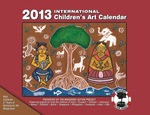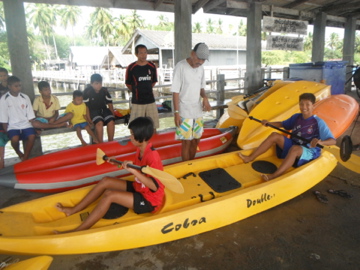Action Alerts: MAP’s 2013 Children’s Mangrove Art Calendars are nearly ready! 
We are now taking pre-orders! Please order your calendars now, so we can better judge how many to print!
20 or more- $8 / calendar
10-19 – $10/ calendar
less than 10 – $14 each
(Prices include shipping) MAP Asia Intern Wanted – Closing Date Nov 16, 2012 – View Job Description Support MAP’s EffortsCALLING FOR MANGROVE ART
READ MORE MAP Calendar Sponsors Still Needed – Help support next year’s calendar now. READ MORE  Green Planet Fundraising Assists MAP – LEARN MORE
URGENT – VOLUNTEERS NEEDED! MAP is looking for volunteer interns for its Thailand Headquarters – READ MORE MAP’s VOLUNTEER INTERNS HELP MAP MAKE A BIG DIFFERENCE
READ MORE
MANGROVE ISSUES MANGROVE BOOK – J. Primavera
The book Beach Forests and Mangrove Associates in the Philippines by J.H. Pimavera and R.B. Sadaba (ISBN 978-971-9931-01-0; National Library CIP QK938.C6 581.75109599 2012 P220120602) is now available. aves, flowers, fruits, utilization and silviculture.
SEE POSTER and order instructions View MAP’s uploaded Videos at MAPmangrover’sChannel “Education In The Mangroves” can now be seen on the PhotoPhilanthropy website here! Marvellous Mangroves – A Curriculum-Based Teachers Guide.
By Martin A. Keeley, Education Director, Mangrove Action Project
Read this 10 page history of the development of MAP’s educational curriculum VIEW DOCUMENT FOR MORE ON MAPs AWARD WINNING CHINA MANGROVE CURRICULUM VISIT THESE SIGHTS
SLIDE SHOW
VIMEO SHOW Education In The Mangroves
Six minute video features discussion of Mangrove Action Project’s Mangrove Curriculum VIEW THE VIDEO
“Question Your Shrimp” Campaign Learn more about the affects of the shrimp industry on mangroves by visiting our blog Editor’s Note: Mangrove Action Project’s Executive Director, Alfrodo Quarto was interviewed about shrimp by Green Acre Radio’s Martha Baskin LISTEN TO INTERVIEW
Join MAP on Facebook
Sign the Consumer’s Pledge to avoid imported shrimp

Not yet a MAP News subscriber?
Click here to subscribe.
Note to Our Readers:
We strive to keep active links in our newsletter. However, due to circumstances beyond our control, occassionally links to stories may become broken. If you find a link to a story is not functioning, please cut and paste the headline into your browser search bar. In most cases you should be able to locate the original story.
  Help Mangrove Action Project submit 100 or more e-waste items by October 31st & we will receive a 10% donation bonus*! List of Accepted E-waste Items: Injet Cartidges, Cell Phones, Pagers, GPS, Radar Detectors, Mobile Hot Spots, Calculators, eBook Readers, iPods/MP3 players, Digital/Video Cameras/Camcorders, PDAs, iPads/Tablets/Laptops, Video Game Consoles, Handheld Video Games Visit the Mangrove Action Project recycle website Click on the recycle button then click on the Download Shipping Label, and follow the instructions. | FEATURED STORY  MAP NEWS 300TH ISSUE MAP NEWS 300TH ISSUE
USA – Mangrove Action Project’s bimonthly “Late Friday News” is celebrating its 300th electronic issue; more than 11 years of recapping important news events and calls to action for issues surrounding mangroves, tropical forests, and the people who depend on them. Over the course of these years, many things have changed, some for the better, in the mangrove conservation and restoration fields. Sadly, many issues still remain: shrimp farming and illegal logging still threaten the health of the world’s mangrove forests, and the traditional ways of life for many coastal people continue to erode. However, in an encouraging shift in awareness, not only are mangrove forests more widely valued, more groups and organizations have become actively involved in their protection and restoration. MAP is proud to have been a positive part in this renewal, and we hope that over the course of the next 300 issues, we can continue to see this type of progress. Throughout this issue, look for “Headlines from the Past” which highlight some of the milestones and challenges which have been part of the landscape over the years. BROWSE NEWS ARCHIVE AMERICAS Headlines from the Past – MARCH 2003 – The First Annual Mangrove Action Day! MAP’s curriculum – the past ten years

CAYMAN ISLANDS – In the ten years since the last anniversary issue MAP’s mangrove curriculum has expanded well beyond the borders of its origins in the Caribbean. Working with like-minded ENGOs and government agencies around the world, the curriculum is now being taught in eight countries – ranging from Guatemala to China and from Brazil to Sri Lanka. We estimate that over 1500 teachers have taught more than 200,000 students in that time frame. In each country MAP Global Education Director, Martin Keeley, follows the same successful pattern. First and foremost it is essential to find a local partner with whom to work. READ MORE Headlines from the Past – APRIL 2001 – Is shrimp farming destroying mangroves? Indonesia’s mangroves account for up to 23% of mangroves worldwide Group denounces Fisheries Act unconstitutional

HONDURAS – The executive director of the Committee for the Defense of Flora and Fauna of the Gulf of Fonseca (Codefagolf), Jorge Varela, denounced the killing of 13 fishermen and destruction of mangroves in the Pacific waters of Honduras. Varela criticized that “the new Fisheries Act is another example of appeasement that characterizes this government and states it is because it is the manner in which they are saying that the “concessions” that have occurred, the public territories that have been given for shrimp farms are made- they are sold, leased, inherited, basically treated like private property. “
“This is a tremendous attack, because the Constitution is useless again, Article 107 of the Constitution prohibits foreign corporations enclaves established in our shores and there are several companies that procure shrimp from other countries. That’s one of the problems we have, “he added. READ MORE Headlines from the Past – AUGUST 2001 – Northwestern Mangroves In India: At The Verge Of Extermination Editor’s Note – This story is about work MAP was involved in Ell Salvador when MAP partnered with EcoViva there in 2011. The message is that our training workshop and intervention there was a success and MAP was able to inspire local community follow-up, local government and local NGO support for the EMR concept and method. This is truly satisfying to see EMR, or at least a version thereof being implemented after our workshop! This is the kind of result we are looking for.
Communities Organise to Confront Climate Change in El Salvador
EL SAVADORE – Armed with chainsaws, machetes and shovels, local residents of El Salvador’s Lower Lempa River Basin, near the Pacific Ocean, are unblocking the flow of rivers and pruning the branches of trees on riverbanks to keep them from falling into the chocolate-colored water. One team is working on clearing the El Espino River. Another is doing the same in El Borbollón, also located in the Lower Lempa River Basin in the department of Usulután, in southwest El Salvador. When the water flows more freely, there is less chance of the rivers overflowing and flooding nearby crops, an increasingly frequent occurrence due to alterations in the cycle of rains and dry spells. Several kilometres to the south, in the mangrove forests of Jiquilisco Bay, Brenda Arely Sánchez walks waist-deep in water along a channel in the Cuche de Monte swamp, which she and a small army of women have reopened with machetes in order to improve the flow of saltwater and promote the recovery of the mangrove trees. READ MORE Headlines from the Past OCT 2001 – Report: Aquaculture imports to target U.S. seafood market Pacific iron fertilisation is ‘blatant violation’ of international regulations
CANADA – A controversial American businessman dumped around 100 tonnes of iron sulphate into the Pacific Ocean as part of a geoengineering scheme off the west coast of Canada in July, a Guardian investigation can reveal. Lawyers, environmentalists and civil society groups are calling it a “blatant violation” of two international moratoria and the news is likely to spark outrage at a United Nations environmental summit taking place in India this week. Satellite images appear to confirm the claim by Californian Russ George that the iron has spawned an artificial plankton bloom as large as 10,000 square kilometres. The intention is for the plankton to absorb carbon dioxide and then sink to the ocean bed – a geoengineering technique known as ocean fertilisation that he hopes will net lucrative carbon credits. READ MORE
Climate scientists urge protection of coastal ecosystems
USA – Climate scientists in the United States are calling for greater protection of coastal ecosystems following a study that shows them to be major absorbers of CO2. They say the destruction of systems like mangrove swamps, may release more than one billion tonnes of carbon into atmosphere every year and contributes significantly to climate change. Ben Gruber reports. VIEW REPORT AFRICA Headlines from the Past – JUNE 2003 – MAP Advisor Wins International Award Iran shrimp exports to hit $350m
IRAN – About USD 210 million worth of aquatics were exported in the past Iranian year (ended March 20) and the figure is expected to exceed USD 350 million in the current year. Head of Iran Fishery Organization Gholamreza Razaqi said on Wednesday that more than 800 metric tons (MT) of aquatic products are planned to be produced this year while the figure for the past year was 663,000 MT, IRNA reported. The official also said that development of aquatic breeding sector is one of the top priorities of agricultural sector, pointing out that implementation of cage fish farming projects is among the objectives pursued by the organization. He referred to China, South Korea, European and neighbor countries as the main destinations for Iran’s aquatic exports. READ MORE ASIA Headlines from the Past – MAY 2002 – MAP opens new regional office in Thailand. Kayak Eco-tourism Training a Huge Success in Thailand

THAILAND – It is clear that the success of conservation initiatives is contingent on the communities that live with and depend on declining resources worldwide. Without the support and initiative of local communities, conservation projects continually fail to meet their objectives, wasting precious time and effort. This is why it is not only important to gain local support of conservation projects, but to increase the sustainability of local livelihoods that can ease pressure off of the natural resources. Community-based tourism can play an important role here. It is a great way to bring money, new experiences and new perspectives to communities. From September 29th to 30th, we at MAP Asia had an opportunity to work with a village in Koh Phra Thong to help develop their budding homestay program. Ta Pae Yoi, a small fishing community is found on the east coast of Koh Phra Thong, an island on the Andaman coast here in Thailand. Against a stunning mountainous backdrop the mangroves grow in dense thickets around the island. While we spent some time discussing the important details, costs and logistics of their new program, the real fun was during the day when we worked with John Gray Sea Canoe and Andaman Discoveries training local kayak tour guides. READ MORE Asian Seafood Raised on Pig Feces Approved for U.S. Consumers

VIETNAM – At Ngoc Sinh Seafoods Trading & Processing Export Enterprise, a seafood exporter on Vietnam’s southern coast, workers stand on a dirty floor sorting shrimp one hot September day. There’s trash on the floor, and flies crawl over baskets of processed shrimp stacked in an unchilled room in Ca Mau. Elsewhere in Ca Mau, Nguyen Van Hoang packs shrimp headed for the U.S. in dirty plastic tubs. He covers them in ice made with tap water that the Vietnamese Health Ministry says should be boiled before drinking because of the risk of contamination with bacteria. Vietnam ships 100 million pounds of shrimp a year to the U.S. That’s almost 8 percent of the shrimp Americans eat. READ MORE Headlines from the Past – NOVEMBER 2002 – Community-Based Forest Management is not only possible, it is essential Japan ban on Indian shrimp boosts Thai exports
JAPAN – Thai shrimp exporters will enjoy a windfall as Japan has found ethoxyquin contamination in imports from India. “Shrimp exports from India have been banned because of the use of antibiotics, which Vietnam and China are also doing,” said Somsak Praneetatyasai, president of the Thai Shrimp Association Japan has toughened inspections of shrimp from Vietnam and China for ethoxyquin residue levels exceeding its limits. The problem has caused Japan to order more Thai shrimp. Shrimp farmers in Thailand use more pro-biotic medicine instead of antibiotics. Thai shrimp exporters will enjoy a windfall as Japan has found ethoxyquin contamination in imports from India “Shrimp exports from India have been banned because of the use of antibiotics, which Vietnam and China are also doing,” said Somsak Praneetatyasai, president of the Thai Shrimp Association. Japan has toughened inspections of shrimp from Vietnam and China for ethoxyquin residue levels exceeding its limits. The problem has caused Japan to order more Thai shrimp. Shrimp farmers in Thailand use more pro-biotic medicine instead of antibiotics. READ MORE EUROPE Headlines from the Past – DECEMBER 2002 – World Coral Reefs to Die by 2050, Scientist Warns European Commission biofuels proposal threatens wetlands and climate goals
BELGIUM – The European Commission announced yesterday that it will not consider indirect land use change (ILUC) in sustainability requirements for biofuels. Wetlands International is deeply disappointed. This proposal undermines the objective of EU biofuels policy to reduce greenhouse gas emissions. While the additional decision to limit the use of food crops as fuel is welcome, the omission of ILUC factors has direct detrimental consequences for both wetlands and climate. As part of the Renewable Energy Directive (RED) and Fuel Quality Directive (FQD), the European Commission was required to review the impact of ILUC on greenhouse gas emissions and propose legislative action for minimising that impact. Wetlands International has consistently called on the Commission to support the inclusion of ILUC factors in order to account for the full climate impacts of biofuels. The Commission proposal fails to address these serious issues and we call on the European Parliament and Member States to do so. READ MORE LAST WORD What? No Last Word?
~ If you’d like to have the last word on this or any other mangrove related topic, please send us your submission for upcoming newsletters. We’ll choose one per issue to have “the last word”. While we can’t promise to publish everyone’s letter, we do encourage anyone to post comments on our Blog at www. mangroveactionproject.blogspot.com
Not yet a subscriber? Click here to subscribe. Please cut and paste these news alerts/ action alerts on to your own lists and contacts. Help us spread the word and further generate letters of concern, as this can make a big difference in helping to halt a wrongdoing or encourage correct action. |








